The Royal University of Groningen (RUG) from the Netherlands recently visited Universitas Gadjah Mada (UGM) in Yogyakarta, Indonesia, to explore and survey UGM’s Student Community Service Program, known as KKN-PPM (Kuliah Kerja Nyata – Pembelajaran Pemberdayaan Masyarakat). During their visit, representatives from RUG aimed to learn more about the program, its impact, and the potential for collaboration in future KKN activities.
The RUG delegation consisted of Dr. B.J.W. (Bartjan) Pennink, an expert in qualitative research methodology, local economic research development, and team management dialogue, and J.C. (John) Falvey, MA, who specializes in international strategy and relations at the University of Groningen. They were welcomed by UGM representatives, including Prof. Ir. Irfan Dwidya Prijambada, M.Eng., Ph.D., former Director of Community Service at UGM, and Prof. Nanung Agus Fitriyanto, S.Pt., M.Sc., Ph.D., IPM, the Head of UGM’s KKN Program.
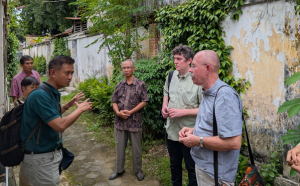 |
Head of UGM’s KKN Program Prof. Nanung Agus Fitriyanto, S.Pt., M.Sc., Ph.D., when he was explaining how the community in Demangan Village – Subdistrict Gondokusuman used inactive alley in their area to plant Javanese Chili that has selling value.
Field Visits and Program Highlights
The RUG team visited several KKN sites in Yogyakarta and Gunungkidul Districts, including Subdistrict Gondokusuman and Subdistrict Depok (Yogyakarta District), as well as Subdistrict Ngawen and Subdistrict Nglipar (Gunungkidul District). They also explored a site in East Lombok, West Nusa Tenggara. During these visits, UGM students presented their ongoing community-based programs, sharing insights into village potentials and the challenges they encountered while working in rural settings.
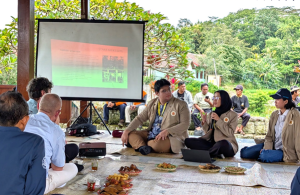 |
UGM KKN students in Gunung Gambar presented about their programs and its challenges during their KKN periode.
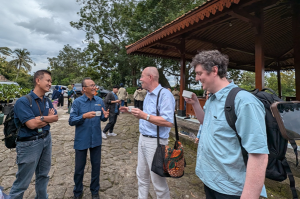 |
The visiting professors had the opportunity to taste the coffee of Gunung Gambar and praised its exceptional flavor.
One of the standout programs in Subdistrict Ngawen, specifically in Gunung Gambar village, focused on helping the local community develop their coffee production. UGM students worked closely with villagers to enhance the quality and marketability of their coffee, aiming to position it as a premium product with high economic value. During the visit, the local community also invited the professors to plant coffee trees as a symbolic gesture to strengthen the recognition of Gunung Gambar’s coffee and to represent their shared commitment to fostering sustainable local development. The visiting professors had the opportunity to taste the coffee and praised its exceptional flavor, noting its potential to boost local income.
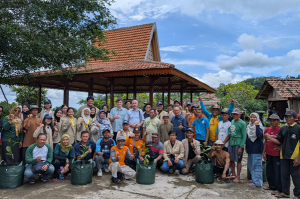 |
The UGM KKN students, the local community of Gunung Gambar, and the visiting professors took a picture together after planting coffee trees as a symbolic gesture to strengthen the recognition of Gunung Gambar’s coffee
Strengthening International Collaboration
The University of Groningen expressed keen interest in sending their students to participate in KKN-PPM alongside UGM students. According to Dr. Bartjan Pennink, “This program showcases how academic initiatives can directly empower communities while providing students with hands-on learning experiences. Partnering in such a program aligns perfectly with our goals to promote sustainable development through education.”
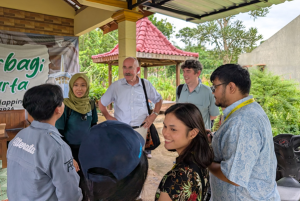 |
dr. Bartjan Pennink discussed with the UGM KKN student from Subdistrict Nglipar, Gunungkidul and its supervisor about the ways to ensure their programs continue to benefit the community after the KKN period end.
Building on the discussion around the program’s potential, Prof. Nanung Agus Fitriyanto highlighted the significance of the visit: “The collaboration with the University of Groningen could enrich the KKN experience, allowing for cross-cultural learning and the exchange of ideas. It’s an opportunity for students to learn from diverse perspectives while addressing real-world challenges.”
Prof. Irfan Dwidya Prijambada added, “Students should not merely act under the banner of ‘anything that helps.’ Instead, their efforts must align with their knowledge and skills to ensure meaningful contributions. By focusing on areas where they can truly make a difference, we can maximize the impact of their work and prevent wasted potential.”
UGM students also shared their reflections on the unexpected moments during KKN. One student noted, “Building emotional connections with the community was something I never anticipated. Living and working alongside them taught me about their resilience and kindness, which changed my outlook on people.” Another highlighted, “Even small actions can have a big impact. Simple gestures of gratitude from the community were deeply moving and motivating.”
When asked about the prospect of having international students join their KKN teams, UGM students expressed enthusiasm, noting that the experience would be a mutual learning process. “Even we, as Indonesians, have to adapt to the local languages and customs during KKN. Having international students join would just add another layer of learning,” one student explained.
Supporting the Sustainable Development Goals (SDGs)
The KKN-PPM program at UGM aligns with several Sustainable Development Goals (SDGs), contributing to achieving Goal 8: Decent Work and Economic Growth by enhancing local coffee production and creating market opportunities that support sustainable economic growth for rural communities. Additionally, it promotes Goal 11: Sustainable Cities and Communities by fostering community resilience and addressing local challenges while leveraging the potential of villages. Furthermore, the program exemplifies Goal 17: Partnerships for the Goals through the collaboration between UGM and the University of Groningen, showcasing how such partnerships can amplify the impact of educational initiatives on sustainable development.
Looking Ahead
The University of Groningen’s visit marks a significant step toward enhancing UGM’s KKN-PPM program with global perspectives. By integrating students from diverse cultural and academic backgrounds, both universities aim to create a more impactful and enriching community service program that remains locally rooted while gaining global recognition for its effectiveness. With the program set to conclude on February 7, 2024, the partnership discussions between UGM and RUG offer hope for a long-lasting collaboration that bridges academic institutions and communities across borders.
author: bil
